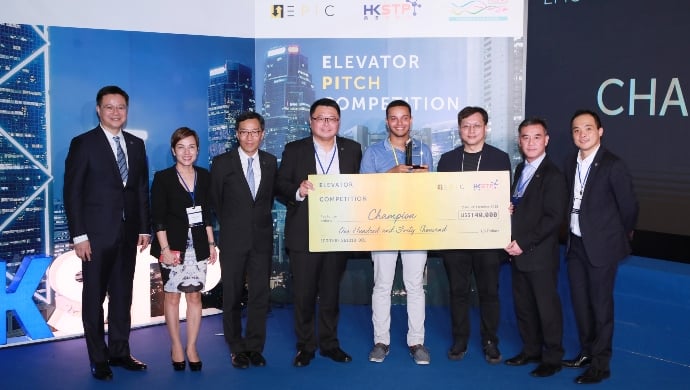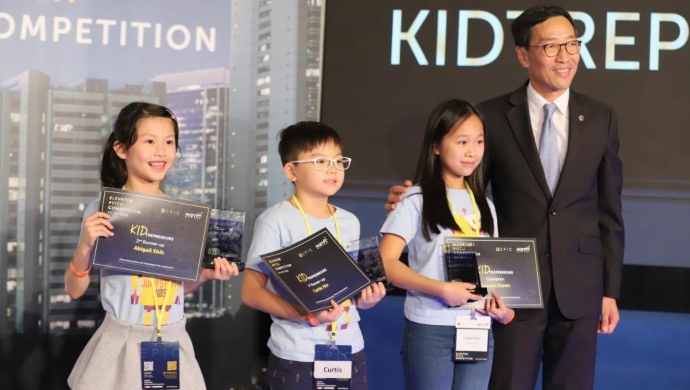The finals also featured a pitching competition from kid-trepreneurs, which brought a breath of fresh air

DASH Systems, an American company that has built a drone for airdrop delivery, took home US$150,000 dollars’ worth of cash and investment after being crowned champion (and winning Artificial Intelligence and Robotics category) at the Elevator Pitch Competition 2018 (EPiC) pitching competition in Hong Kong.
The drone, which looks a bit like a flying dreidel, is designed to be thrown out of an aircraft. The technology then “turns on” and the package is piloted to its destination. DASH says it can land softly within a few metres of the desired location.
Currently the company is reaching out to humanitarian relief efforts because it is the hard-to-reach locations that often struggle to recover from a natural disaster.
The reason e27 highlighted the fact that the company is American is because the international flavour of the EPiC was a point of pride for the organisers.
“The large number of entries, diversity of participants and the enthusiasm they displayed throughout the competition pleasantly surprised us. The competition has become a great platform for Hong Kong to show its strength as an innovation and technology start-up hub to the international community,” said Albert Wong, the CEO of Hong Kong Science and Technology Park in a statement.
The competition also featured other category winners (who took home a US$10,000 cash prize), including Artificial Intelligence and Robotics, Fintech, Healthy Ageing, Smart City and Next Generation Technology, and a pitching competition featuring kids.
Also Read: Hong Kong science and tech hub set to deploy US$1.3B focussed on startups
Before taking a look at all the finalists at EPiC, let’s start with the kids because that is fun. (We changed their names to protect their privacy.)
Kiddos

Lauren Kwan [The winner]: The winning pitch was a game designed to inspire kids who want to become doctors. Called Stethoscopers, the game takes children through the process of being a doctor in a fun and interactive story. It starts with basic surgery prep and slowly works all the way up to a medical vocabulary exam.
Curtis Ho [First runner-up]: Too busy to think of what to cook at home? Read Time Food helps people choose a healthy meal and provides live videos to help them prepare the dish. Rather than going to the grocery store and wandering around aimlessly, Real Time Food wants to give direction to your shopping.
Abigail Shih [Second runner-up]: Even kids struggle with what to wear in the morning. Dress Up wants to fix this problem. It is an app that suggests what a person should wear based on their daily schedules, mood and personal preferences. People simply need to update their closet in the app and the technology does the rest of the work.
The Finalists
Link4 Australia [Winner of the Fintech category] — Australia
Link4 Australia is an electronic invoicing service targeting SMEs. Invoicing is essential to the survival of any business, but it is also typically a gigantic headache.
Link4 helps companies exchange invoices securely and efficiently through a ‘current accounting package’. The system sends the invoices directly into their partners’ accounting systems and cloud software.
A major perk is it eliminates the data entry portion of invoicing.
AuramerBio Limited — New Zealand
AuramerBio is a company that is trying to help authority figures more quickly test for drugs. The pitch surrounded drivers, criminals or long-haul drivers. The technology analyses the individual’s saliva and quickly tells the officer if the person has illicit drugs in their system.
The startup is raising US$800,000 and hopes to go to market in 2019.
WildFaces.ai [Winner of the Smart City category] — Hong Kong
This startup is working to improve the cost efficiency of facial recognition technology. Instead of leveraging CCTV cameras, the goal of WildFaces is to leverage existing technology — like body cams, drones, robots and mobile cameras, to build an overarching system for facial recognition.
WildFaces also does not store personal information and uses an anonymous ID system to allay concerns about privacy.
DASH Systems [Overall champion and winner of AI & Robotics category] — US
As highlighted above, DASH is a drone-based airdrop service to help deliver packages to hard-to-reach areas. Planes and helicopters are often limited by the safety of the landing area and DASH hopes to circumvent this pain-point.
Fagougou Technology — China
Faguogo is a chatbot that wants to offer quick and accurate legal advice to Chinese citizens. The company claims it has helped 500,000 people with their problems. It also has helped 10 provincial governments set up legal services in their district. Furthermore, 100 law offices use Faguogo to improve their digital legal services.
Guzip Biomarkers — Taiwan
A spin-off of Taipei Medical University, Guzip is using in-vitro diagnostics (explain) to test for endometrial cancer. The technology uses Pap smears to detect for cancer.
The company thinks its technology is superior in the market due to specificity and accuracy. It hopes to become the mainstream product for IVD diagnostics.
VisusNano [Winner of Healthy Ageing category] — UK
Rarely is a product equally applicable to humans and animals, but VisusNano has that kind of product. It aims to help alleviate cataracts without using eye drops post-surgery.
The technology attaches to lenses and slowly releases the medicines used after surgery. Because it leverages a physical device, it can be given to pets just as easily as to humans.
CYFEER Joint Stock Company — Vietnam
Companies like AirBnB and Booking.com have become the go-to source for accommodation bookings worldwide. However, for companies leveraging the system, the property management systems are lagging.
CYFEER (which has branded its product as CyHome) has built a management system that acts like a hub, connecting the building manager, supplier and guest. It offers a payment system, an online community and an online mall that people can use to purchase goods.
Also Read: Hong Kong startup ecosystem reaching for the top floor
The company was launched in November 2017 and serves 36 buildings that manage 12,000 guests.
Titanology Limited [Winner of Next Generation Technology category] — Hong Kong
No matter how much effort people put into personal hygiene, door handles are a primary source of germ proliferation. Titanology wants to change this with a door handle that sanitises hands when touched.
The company wants to take the door handle technology and apply it to a host of household devices.
Zio Health — UK
A home biosensor company, Zio Health wants to test fluids like breast milk, saliva, urine, blood, water and formula milk for contaminants.
The company is targeting the Chinese market and the software components intends all mothers to improve their health by tailoring their health to personalised advice.
————-
Disclosure: This article is produced by e27 content marketing, sponsored by the Hong Kong and Technology Parks Corporation (HKSTP)
The post American startup that wants to airdrop delivery packages wins EPiC elevator pitching event appeared first on e27.